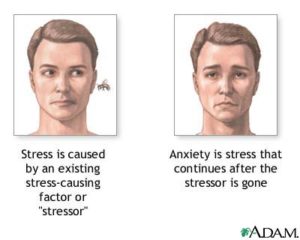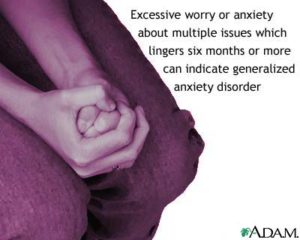Stress is a feeling of emotional or physical tension. It can come from any event or thought that makes you feel frustrated, angry, or nervous.
Stress is your body’s reaction to a challenge or demand. In short bursts, stress can be positive, such as when it helps you avoid danger or meet a deadline. But when stress lasts for a long time, it may harm your health.

Considerations
Stress is a normal feeling. There are two main types of stress:
- Acute stress. This is short-term stress that goes away quickly. You feel it when you slam on the brakes, have a fight with your partner, or ski down a steep slope. It helps you manage dangerous situations. It also occurs when you do something new or exciting. All people have acute stress at one time or another.
- Chronic stress. This is stress that lasts for a longer period of time. You may have chronic stress if you have money problems, an unhappy marriage, or trouble at work. Any type of stress that goes on for weeks or months is chronic stress. You can become so used to chronic stress that you don’t realize it is a problem. If you don’t find ways to manage stress, it may lead to health problems.
STRESS AND YOUR BODY
Your body reacts to stress by releasing hormones. These hormones make your brain more alert, cause your muscles to tense, and increase your pulse. In the short term, these reactions are good because they can help you handle the situation causing stress. This is your body’s way of protecting itself.
When you have chronic stress, your body stays alert, even though there is no danger. Over time, this puts you at risk for health problems, including:
- High blood pressure
- Heart disease
- Diabetes
- Obesity
- Depression or anxiety
- Skin problems, such as acne or eczema
- Menstrual problems
If you already have a health condition, chronic stress can make it worse.
SIGNS OF TOO MUCH STRESS
Stress can cause many types of physical and emotional symptoms. Sometimes, you may not realize these symptoms are caused by stress. Here are some signs that stress may be affecting you:
- Diarrhea or constipation
- Forgetfulness
- Frequent aches and pains
- Headaches
- Lack of energy or focus
- Sexual problems
- Stiff jaw or neck
- Tiredness
- Trouble sleeping or sleeping too much
- Upset stomach
- Use of alcohol or drugs to relax
- Weight loss or gain
Causes
The causes of stress are different for each person. You can have stress from good challenges and as well as bad ones. Some common sources of stress include:
- Getting married or divorced
- Starting a new job
- The death of a spouse or close family member
- Getting laid off
- Retiring
- Having a baby
- Money problems
- Moving
- Having a serious illness
- Problems at work
- Problems at home

When to Contact a Medical Professional
Call a suicide hotline if you have thoughts of suicide.
Call your health care provider if you feel overwhelmed by stress, or if it is affecting your health. Also call your provider if you notice new or unusual symptoms.
Reasons you may want to seek help are:
- You have feelings of panic, such as dizziness, rapid breathing, or a racing heartbeat.
- You are unable to work or function at home or at your job.
- You have fears that you cannot control.
- You are having memories of a traumatic event.
Your provider may refer you to a mental health care provider. You can talk to this professional about your feelings, what seems to make your stress better or worse, and why you think you are having this problem. You may also work on developing ways to reduce stress in your life.
Alternative Names
Anxiety; Feeling uptight; Stress; Tension; Jitters; Apprehension
References
Ahmed SM, Hershberger PJ, Lemkau JP. Psychosocial influences on health. In: Rakel RE, Rakel DP, eds. Textbook of Family Medicine. 9th ed. Philadelphia, PA: Elsevier; 2016:chap 3.
National Institute of Mental Health website. 5 things you should know about stress. www.nimh.nih.gov/health/publications/stress/index.shtml. Accessed June 25, 2020.
Vaccarino V, Bremner JD. Psychiatric and behavioral aspects of cardiovascular disease. In: Zipes DP, Libby P, Bonow RO, Mann DL, Tomaselli GF, Braunwald E, eds. Braunwald’s Heart Disease: A Textbook of Cardiovascular Medicine. 11th ed. Philadelphia, PA: Elsevier; 2019:chap 96.
Review Date 5/10/2020
Updated by: Fred K. Berger, MD, addiction and forensic psychiatrist, Scripps Memorial Hospital, La Jolla, CA. Also reviewed by David Zieve, MD, MHA, Medical Director, Brenda Conaway, Editorial Director, and the A.D.A.M. Editorial team.
Original Article – https://medlineplus.gov/ency/article/003211.htm





